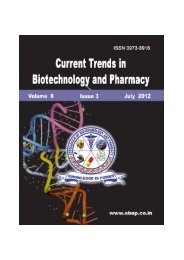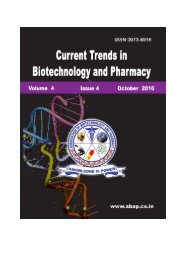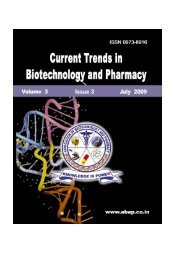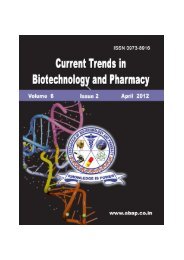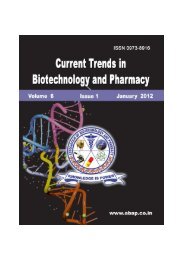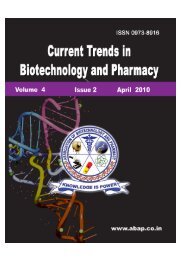April Journal-2009.p65 - Association of Biotechnology and Pharmacy
April Journal-2009.p65 - Association of Biotechnology and Pharmacy
April Journal-2009.p65 - Association of Biotechnology and Pharmacy
Create successful ePaper yourself
Turn your PDF publications into a flip-book with our unique Google optimized e-Paper software.
Current Trends in <strong>Biotechnology</strong> <strong>and</strong> <strong>Pharmacy</strong><br />
Vol. 3 (2) 113-127, <strong>April</strong> 2009. ISSN 0973-8916<br />
Transgenic plants not only provide the<br />
means to express antibodies but also enable the<br />
glycosylation <strong>and</strong> entry into secretory pathway<br />
which allow assembly <strong>of</strong> complete antibodies <strong>and</strong><br />
Fab fragments. Variable fragments (Fv) can be<br />
produced in cytosol, directed to different<br />
compartments <strong>and</strong> fused with proteins such as<br />
protein A <strong>and</strong> phosphatase to improve the<br />
detection <strong>and</strong> purification <strong>of</strong> single chain Fv<br />
(scFv). In plants, antibody production (1-5% <strong>of</strong><br />
total plant protein) has been achieved by crosspollination<br />
<strong>of</strong> individually transformed plants<br />
expressing light or heavy chains (29). Other<br />
approaches involve double transformation or<br />
transformation by constructs having genes for<br />
both light <strong>and</strong> heavy chains on the same vector.<br />
Despite the fact that production <strong>of</strong> antibodies in<br />
plants takes longer, the low cost <strong>of</strong> production<br />
<strong>and</strong> capability <strong>of</strong> increasing production simply by<br />
increased propagation make plant antibodies an<br />
attractive proposition.<br />
Aiming at therapeutic treatment (14) , have<br />
succeeded in producing multimeric secretory IgA<br />
(SIgA) molecules in plants which represent the<br />
predominant form <strong>of</strong> immunoglobulin in mucosal<br />
secretions. SIgA not only contains heavy <strong>and</strong> light<br />
chains but it is also dimerized by a J chain, <strong>and</strong><br />
protected from proteolysis by a fourth polypeptide,<br />
the SC. Production <strong>of</strong> such antibodies in<br />
mammalian cells is very complex because <strong>of</strong> the<br />
requirement <strong>of</strong> B cell as well as gut epithelial<br />
cells for the formation <strong>of</strong> the SIgA. Thus, four<br />
transgenic tobacco plants were produced by<br />
genetic engineering which produced a murine<br />
monoclonal antibody light k chain, the hybrid IgA-<br />
G antibody heavy chain, murine J chain <strong>and</strong> rabbit<br />
secretory component. A series <strong>of</strong> sexual crosses<br />
was carried out to allow expression <strong>of</strong> all the four<br />
proteins simultaneously. The progeny produced<br />
a functional secretory immunoglobulin very<br />
efficiently. This demonstrated the potential <strong>of</strong><br />
plants in assembly <strong>of</strong> antibodies, <strong>and</strong> the flexibility<br />
<strong>of</strong> system. Recently, a humanized monoclonal<br />
122<br />
antibody against glycoprotein B <strong>of</strong> herpes simplex<br />
virus 2 (HSV-2) has been expressed in soybean.<br />
This antibody was found to possess the same<br />
efficacy for prevention <strong>of</strong> vaginal HSV-2 infection<br />
in mice <strong>and</strong> similar stability in human semen as<br />
the antibody expressed in human cell culture (52)<br />
<strong>and</strong> also plant cell cultures (23).<br />
Topical application <strong>of</strong> antibodies has already<br />
been shown to control infection by way <strong>of</strong> passive<br />
immunization. A hybrid monoclonal antibody (IgA/<br />
G), having constant regions <strong>of</strong> IgG <strong>and</strong> IgA fused,<br />
has been used successfully against human dental<br />
caries caused by the bacterium Streptococcus<br />
mutans (33). Ma et al. (1998) compared the<br />
secretory antibody produced in transgenic tobacco<br />
(SIgA/G) <strong>and</strong> the original mouse IgG. Though both<br />
had similar binding affinity to surface adhesion<br />
protein <strong>of</strong> S.mutans, SIgA/G survived for three<br />
days in the oral cavity, whereas IgG could survive<br />
for just one day. The plant antibody provided<br />
protection against the colonization <strong>of</strong> the S.<br />
mutans for at least four months. These results<br />
show that this strategy could be useful for many<br />
other mucosal infections in humans <strong>and</strong> animals.<br />
Medical molecular farming has been done for the<br />
production <strong>of</strong> antibodies, biopharmaceuticals <strong>and</strong><br />
edible vaccines in plants for immunotherapy (16,<br />
31 <strong>and</strong> 32). Co-expression <strong>of</strong> soybean glycinias<br />
A1 aB 1b <strong>and</strong> A3B4 enhances their accumulation<br />
levels in transgenic rice seeds (62).<br />
Scope for future study<br />
Vaccines have been one <strong>of</strong> the most farreaching<br />
<strong>and</strong> important public health initiatives <strong>of</strong><br />
the 20 th century. Advancing technology, such as<br />
oral DNA vaccines, intranasal delivery <strong>and</strong> edible<br />
plant derived vaccines, may lead to a future <strong>of</strong><br />
safer <strong>and</strong> more effective immunization. Edible<br />
vaccines, in particular, might overcome some <strong>of</strong><br />
the difficulties <strong>of</strong> production, distribution <strong>and</strong><br />
delivery associated with traditional vaccines.<br />
Significant challenges are still to be overcome<br />
before vaccine crops can become a reality.<br />
Plant Derived Edible Vaccines



